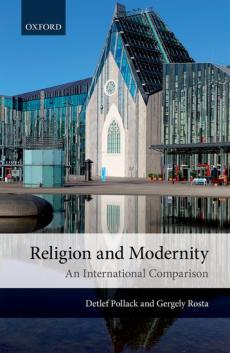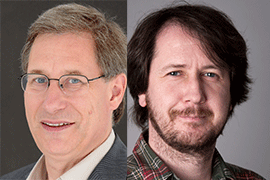„RELIGION AND MODERNITY“
Fundamental work on the role of religion in modern societies by sociologist Detlef Pollack published in English

A fundamental work on the role of religion in modern societies by sociologists Detlef Pollack and Gergely Rosta from Münster University’s Cluster of Excellence “Religion and Politics” has now been published in English by Oxford University Press under the title of “Religion and Modernity: An International Comparison”. The highly acclaimed monograph was first released in German under the title of “Religion in der Moderne” in 2015. It contributes to the understanding of contemporary religious developments by presenting the most important theories that deal with the relationship between religion and modernity. It also considers how the social significance of religion changed in modern societies and examines the factors and conditions that have contributed to these changes. The book includes empirical case studies to identify overarching patterns and determinants of religious change in modern and modernizing societies.
“Religion and Modernity: An International Comparison” is not a book that provides a new integrated theory of religious change in modern societies, but rather one that develops theoretical elements that contribute to the understanding of some contemporary religious developments. Most of the approaches in sociology of religion are prone to emphasise either processes of religious decline or of religious upswing. For example, secularization theory usually includes a couple of relevant factors—such as functional differentiation, economic affluence or social equality—in order to account for religious change. However, the result of such a theory's empirical analyses seems to be certain in advance, namely that the social relevance of religion is decreasing. In contrast, the religious market model devised by sociologists of religion in the US is inclined to detect everywhere processes of religious upsurge.

The monograph avoids a purely theoretically based perspective on religious changes. For this reason, Detlef Pollack and Gergely Rosta do not begin with theoretical propositions but with questions. The authors raise the question of how the social significance of religion in its various facets has changed in modern societies, and explain what factors and conditions have contributed to these changes.
Author Information
Detlef Pollack is Professor of Sociology of Religion at Münster University. He is speaker of the Cluster of Excellence "Religion and Politics" at Münster University. His research focuses on religious change in Western and Eastern Europe and in the US and political culture in Eastern and Central East Europe. His publications include The Role of Religion in Modern Societies (co-edited with Daniel V. A. Olson; Routledge, 2011) and Handbuch Religionssoziologie (Springer, 2017).
Gergely Rosta was Research Fellow at the Cluster of Excellence "Religion and Politics" at Münster University from 2009 to 2017. He is currently Associate Professor in Sociology at the Pázmány Péter Catholic University in Budapest. His research interests include religious change in Central and Eastern Europe, youth religiosity, and quantitative research methods. (asc/vvm)

